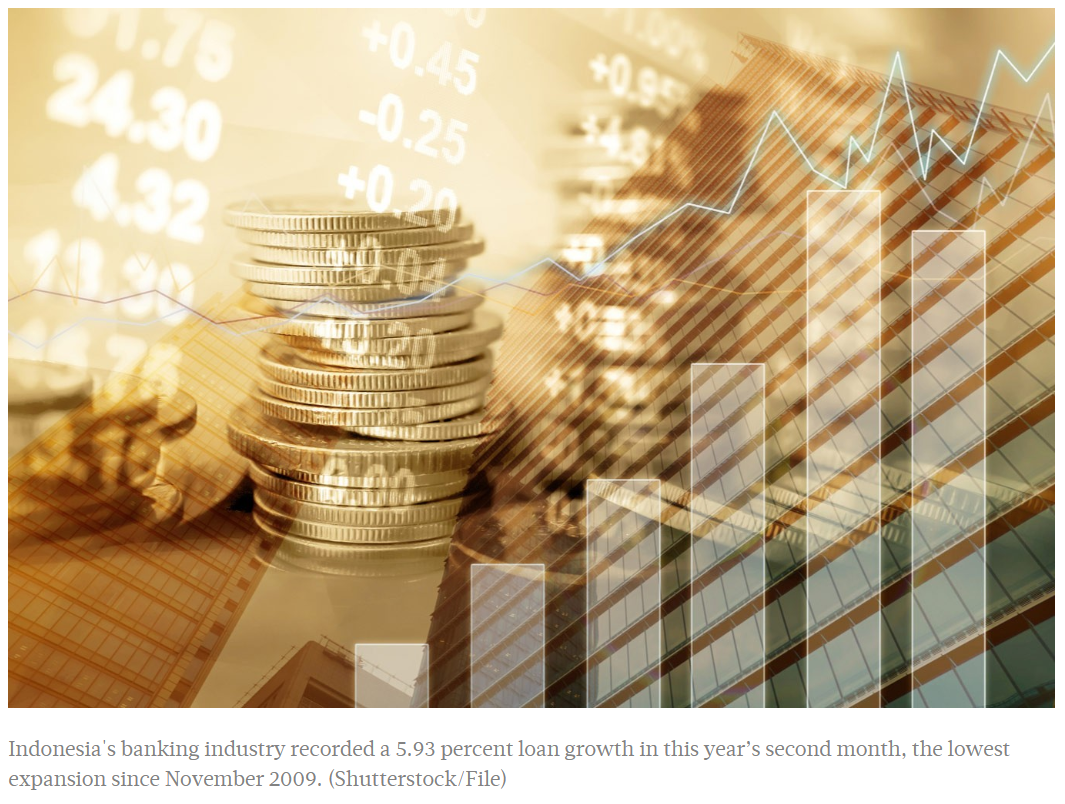COVID-19 batters Indonesia’s loan growth to record low
Indonesia’s loan growth fell to a more than 10-year low in February as a cooling economy due to the COVID-19 pandemic hit credit demand across business sectors.
The country’s banking industry recorded a 5.93 percent loan growth in this year’s second month, the lowest expansion since November 2009, according to Financial Services Authority (OJK) data. The figure is lower than 6.1 percent booked in January.
Non-performing loans (NPL) jumped to nearly 2.8 percent, the highest since May last year.
“The slow loan growth was caused by weak demand in line with the economic cycle, which has been slowing since 2019’s fourth quarter,” said Bank Permata economist Josua Pardede on Thursday.
“Considering that the COVID-19 pandemic will slow down the domestic economy, particularly household spending and private investment, loan growth in 2020 is estimated to continue to be weak,” he added.
The spread of the coronavirus has forced the government to call on citizens to stay home to contain the disease contagion, causing business disruptions and hitting people’s purchasing power. Official data show that COVID-19 had infected more than 1,986 people with 181 fatalities as of Friday afternoon.
The government projects Indonesia’s economy to grow 2.3 percent this year under the baseline scenario, which would be the lowest rate since 1999, or contract by 0.4 percent in the worst-case scenario as the pandemic batters activity.
Josua said the pandemic had significantly hit six sectors, namely the transportation, warehousing and communication sector, the accommodation, food and beverage sector, wholesale and retail trade, the agriculture, plantation and forestry sector, the mining sector and the processing industry sector.
He projected Indonesia’s loan growth to reach between 4 and 6 percent this year compared to 6.08 percent in 2019. The OJK and Bank Indonesia previously set a loan growth target of around 11 percent this year. The central bank recently slashed its projection to between 6 and 8 percent.
State-owned Bank Mandiri president director Royke Tumilaar said in a teleconferenced press briefing on Wednesday that the country’s second-largest bank by assets value would revise its loan growth, which was initially penciled at between 8 and 10 percent this year. However, he stopped short of mentioning the new figure.
“But this doesn’t mean there are no loan expansions. At certain times, [loan disbursements] will be very selective,” he said.
He expressed hope that the bank could still maintain collectibility and keep NPL in check following a new OJK regulation that eases bank loan restructuring.
The OJK relaxed debt quality assessment and restructuring requirements for debtors. Banks now only assess the quality of a loan worth up to Rp 10 billion (US$594,282) based on a debtor’s timeliness in paying the loan’s principal and interest. Previously, the banks also assessed the debtor’s business prospects and financial condition.
Debtors who restructure their loans will get an improvement in their loan quality after the process and banks can implement such a policy for any loan amount, among other policies.
The central bank, on the other hand, has also cut its benchmark interest rate twice so far this year by a total of 50 basis points (bps) to 4.5 percent to cushion the economy from impacts of the disease.
While the benchmark rate cuts could potentially push down bank interest rates, its impact on loan growth would be limited as risks tended to increase, Josua argued.
“Therefore, government stimulus like social safety nets, cash transfers and stimulus for the affected sectors, coupled with counter-cyclical and cyclical policies from the OJK as well as relaxations from BI, will boost economic activities after the COVID-19 pandemic ends,” he said, adding that all of these would ultimately push up loan growth.
Meanwhile, Bank Mandiri chief economist Andry Asmoro was of the view that the impacts of the COVID-19 outbreak on the economy and banking industry remained uncertain.
“Hence, banks will remain cautious about the affected sectors and will focus on managing asset quality,” he wrote in a statement made available to The Jakarta Post on Thursday.
Source: https://www.thejakartapost.com/news/2020/04/06/covid-19-batters-indonesias-loan-growth-to-record-low.html


 English
English




